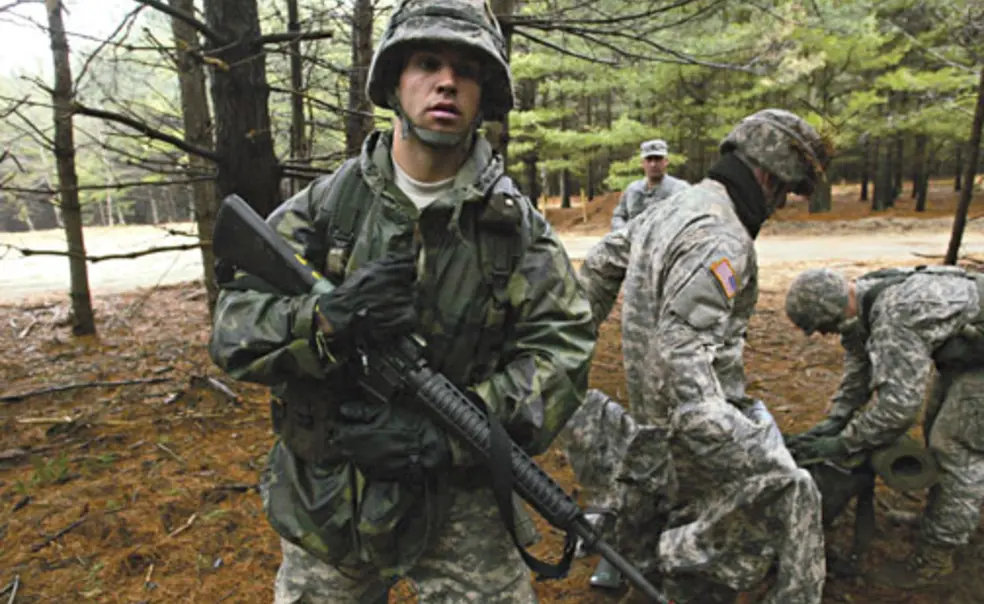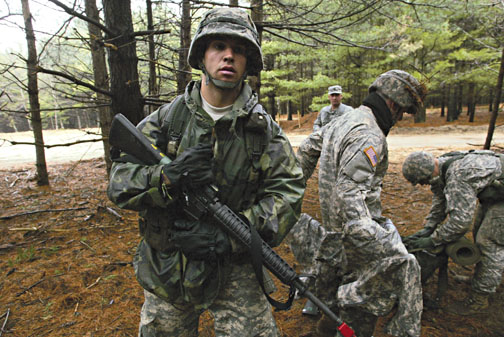Though top administrators have acted more warmly toward Princeton’s ROTC program in recent years, the program’s new commander, Lt. Col. John Stark, insists that the University merely “tolerates” ROTC and has reneged on a decades-old agreement to give academic credit for ROTC coursework.
Princeton is one of only four Ivy League universities, along with Cornell, Dartmouth, and Penn, that have an ROTC program on campus. But the program’s relations with the University often have been strained. In 1970, soon after the U.S. incursion into Cambodia, the program’s headquarters were firebombed; shortly afterward, the University decided to terminate ROTC. When alumni pressure brought ROTC back to campus in 1972, a memorandum of understanding was signed by President Robert Goheen ’40 *48 and Army Maj. Gen. Verne L. Bowers.
That memorandum states that “academic credit applicable toward graduation will be given for successful completion of those academic courses taught by the institution [i.e., Princeton] which are part of the Army ROTC curriculum; and that academic credit for military professional subjects will be judged by the institution under the same procedure and criteria as for other institutional courses.”
Stark, who arrived on campus last September after serving for two years as a tank battalion task-force operations officer in Iraq, contends that this provision compels the University to give academic credit for ROTC coursework. “I am willing to bet that any judge would see that the contract calls for ROTC accreditation,” he stated in an e-mail. “It is a process, not an automatic granting of credit. I understand that and am willing to put my course through the process to improve it and have the opportunity for credit.” Because ROTC courses do not receive academic credit, Stark added, they must meet at night, which discourages students who already carry full schedules.
Robert Durkee ’69, the University vice president and secretary, disputed Stark’s interpretation of the 1972 memorandum and said that it ignores the history of ROTC’s return to campus. The document, Durkee said, provides only that a regular University course does not cease to earn academic credit simply because a student receives ROTC credit for taking it. But he said the decision whether to award academic credit for purely ROTC coursework is reserved to the faculty, which has declined to grant it.
“The Army,” Durkee said in an e-mail, “returned to campus with the clear understanding that credit would not be provided for ROTC courses. That continues to be the case, and is fully consistent with the University’s overall policy ... that all decisions concerning course credit are reserved to the faculty of the University.”
Durkee added that this interpretation was reiterated by the trustees in 1973 and by President William Bowen *58 in a report reviewing the 1973–74 academic year. Stark, a West Point alumnus who holds a Ph.D. in history from Ohio State, said he has discussed his concerns with President Tilghman.
Notwithstanding the current dispute, there have been signs of warmer relations between the University and ROTC. Tilghman has attended ROTC commissioning ceremonies, and Stark said that ROTC enrollment is slightly higher than in previous years.
Stark seems determined to reintegrate ROTC into the fabric of University life. In April, he attended a conference that examined ways to bring about a rapprochement between Ivy League schools and the military. He also will teach a course open to all undergraduates this fall on “The American Military Experience” through the Program in American Studies.













2 Responses
John G. Middleton ’53
10 Years AgoCourse credit for ROTC
I was shocked, then outraged, to learn that Princeton does not give course credit for ROTC, and hasn’t for decades (Notebook, May 13).
Since I received my education during four years at Exeter, it should come as no surprise that I deem ROTC to have been the single most important course I took at Princeton. Here’s why.
ROTC enabled me to excel at being a forward observer with the 4th Infantry Division in Gelnhausen, Germany. After I received a grade of 98.2 on the battery field test, I was appointed aide-de-camp to the division field artillery commander in Frankfurt. His next-door neighbor was the assistant division commanding general, whose daughter Nancy became my wife less than a year later. We will celebrate our 54th wedding anniversary in August with our three children and three grandchildren.
I had been proud of the fact that Princeton was the only one of the “Big Three” to teach ROTC on campus, assuming that course credit was given. I am absolutely in awe of those who take the course, given all the added pressure of course requirements. Wife Nancy even says, “Why would you take it?”
Information in the PAW article makes it clear that the University reneged on its promise to give course credit, for which the administration and board should be ashamed. I fully support Lt. Col. Stark’s efforts, and fervently hope he succeeds in putting ROTC back where it belongs.
John G. Middleton ’53
10 Years AgoCourse credit for ROTC
I was shocked, then outraged, to learn that Princeton does not give course credit for ROTC, and hasn’t for decades (Notebook, May 13.)
Since I received my education during four years at Exeter, it should come as no surprise that I deem ROTC to have been the single most important course I took at Princeton. Here’s why.
ROTC enabled me to excel at being a forward observer with the 4th Infantry Division in Gelnhausen, Germany. After I received a grade of 98.2 on the battery field test, I was appointed aide-de-camp to the division field artillery commander in Frankfurt. His next-door neighbor was the assistant division commanding general, whose daughter Nancy became my wife less than a year later. We will celebrate our 54th wedding anniversary in August with our three children and three grandchildren.
I had been proud of the fact that Princeton was the only one of the “Big Three” to teach ROTC on campus, assuming that course credit was given. I am absolutely in awe of those who take the course, given all the added pressure of course requirements. Wife Nancy even says, “Why would you take it?”
The PAW article also makes it clear that the University reneged on its promise to give course credit, for which the administration and board should be ashamed. I fully support Lt. Col. Stark’s efforts, and fervently hope he succeeds in putting ROTC back where it belongs.